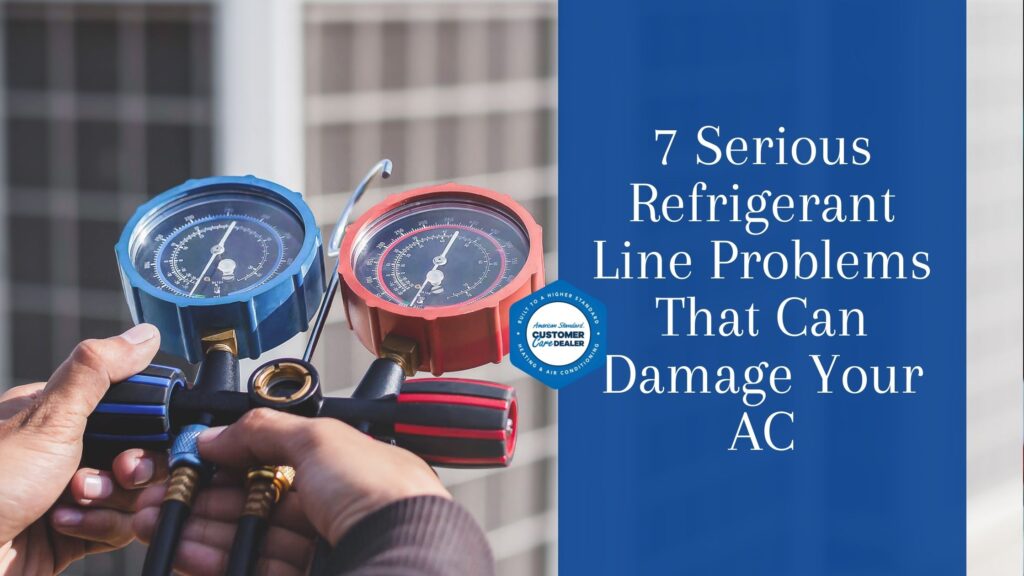7 Serious Refrigerant Line Problems That Can Damage Your AC
When your air conditioner is running but your home still feels warm and uncomfortable, there’s a good chance the problem may be deeper than a dirty filter or a thermostat setting. One of the most overlooked causes of cooling problems is an issue with the refrigerant lines—the copper tubing responsible for moving refrigerant between the indoor and outdoor units.
Your AC can’t cool without refrigerant circulating properly, and when the lines develop leaks, blockages, or damage, the entire system struggles. Many Auburn homeowners don’t realize that refrigerant line issues can cause everything from warm air blowing out of the vents to complete system failure.
This updated guide breaks down seven serious refrigerant line problems, the symptoms to watch for, and the steps you can take to protect your home’s comfort. Whether your air conditioner is losing efficiency, freezing up, or failing to cool at all, understanding these issues can help you act quickly and avoid expensive repairs.
Understanding Your AC’s Refrigerant Lines
Before we dive into the problems, it helps to understand what refrigerant lines do.
Your air conditioner has two essential copper lines:
1. The Suction Line (Large Line)
- Carries cool refrigerant gas back to the outdoor unit
- Insulated to keep temperatures low
- Often cold to the touch when working correctly
2. The Liquid Line (Small Line)
- Delivers warm, high-pressure refrigerant to the indoor coil
- Uninsulated and warm during operation
When both lines function properly, your air conditioner efficiently removes heat from your home and keeps indoor temperatures comfortable. But when something goes wrong with these lines, your system loses efficiency, cools poorly, or stops cooling altogether.
1. Refrigerant Leaks From Cracked or Damaged Lines
Why It Happens
Refrigerant leaks are the most common refrigerant line issue and often occur from:
- Corrosion on copper lines
- Physical damage from lawn equipment
- Vibrations from an aging AC unit
- Poor installation practices
Even a small crack can lead to a significant loss of refrigerant over time.
Symptoms
- AC blows warm air
- Higher energy bills
- Hissing, bubbling, or whistling noises
- Frozen evaporator coil
- AC running constantly
Why It’s Serious
Low refrigerant leads to overheating, system failure, and expensive compressor damage.
Fixes
Only licensed HVAC technicians can legally handle refrigerants. A professional will:
- Locate the leak
- Repair or replace damaged lines
- Recharge the system to proper refrigerant levels
2. Corroded Copper Refrigerant Lines
Why It Happens
Copper naturally corrodes over time, especially in humid climates like Auburn. Contaminants, moisture, and outdoor conditions can weaken the metal and cause tiny pinholes.
Symptoms
- Gradual decline in cooling
- Ice buildup on coils
- Increased energy usage
- Reduced airflow despite system running
Why It’s Serious
Corrosion weakens the lines and increases the chances of leaks and system failure.
Fixes
A technician may:
- Replace damaged sections of tubing
- Install corrosion-resistant coatings
- Inspect insulation and outdoor exposure factors
3. Poorly Insulated Suction Line
Why It Happens
The insulation around your suction line breaks down from:
- Sun exposure
- Physical damage
- Wear and tear over time
When insulation is missing, refrigerant warms up before reaching the compressor, reducing cooling efficiency.
Symptoms
- AC struggles to reach the set temperature
- Higher humidity levels inside the home
- Noticeable water condensation on the line
- Longer cooling cycles
Why It’s Serious
A poorly insulated suction line forces your AC to work harder, raising utility costs and reducing the lifespan of the system.
Fixes
Replacing damaged insulation restores proper cooling and reduces strain.
4. Clogged or Blocked Refrigerant Lines
Why It Happens
Blockages may come from:
- Moisture entering the system
- Debris from deteriorated copper tubing
- Contaminated refrigerant
- Improper installation
Symptoms
- AC runs but does not cool
- Frost forming on small sections of the line
- Sudden drops in system pressure
- Strange sounds during operation
Why It’s Serious
Obstructions restrict refrigerant flow, causing overheating and compressor failure.
Fixes
A professional may:
- Flush the system
- Replace damaged line sections
- Refill with clean, manufacturer-approved refrigerant
5. Improper Installation or Line Sizing
Why It Happens
If your AC installer used improperly sized lines or took shortcuts during installation, you may experience refrigerant flow issues.
Common mistakes include:
- Refrigerant lines that are too long
- Incorrect line diameter
- Kinked or poorly routed lines
Symptoms
- Weak cooling
- High energy bills
- Short cycling
- Frequent repairs
Why It’s Serious
Incorrect installation affects performance from day one and can cause early system failure.
Fixes
A trained HVAC technician will evaluate line sizing and may recommend rerouting or replacing lines for optimal performance.
6. Vibrations or Line Movement Causing Wear
Why It Happens
AC units naturally vibrate during operation. Over time, vibrations can rub refrigerant lines against walls or other metal surfaces, wearing down the copper.
Symptoms
- Intermittent cooling
- Visible wear marks on refrigerant lines
- Clicking or rattling noises during operation
Why It’s Serious
Unchecked vibration can eventually puncture the line, causing a refrigerant leak.
Fixes
Solutions may include:
- Securing lines with brackets or supports
- Adding protective padding
- Replacing worn sections
7. Freezing Due to Improper Refrigerant Levels
Why It Happens
Both low and high refrigerant levels can cause refrigerant lines to freeze. Freezing is especially common when:
- Filters are dirty
- Coils are covered in dust
- Evaporator airflow is restricted
Symptoms
- Ice on refrigerant lines or coils
- Warm air blowing from vents
- Water puddles near the indoor unit
- Long or short cooling cycles
Why It’s Serious
Frozen lines disrupt the entire system, put stress on the compressor, and can lead to expensive repairs.
Fixes
A technician will:
- Check refrigerant levels
- Inspect airflow
- Clean coils and replace filters
How These Issues Affect Your AC System Long-Term
If refrigerant line problems go untreated, you may experience:
Higher Utility Bills
Your AC must run longer to cool your home.
Reduced Comfort
Inconsistent cooling, hot spots, and humidity issues develop quickly.
Early System Failure
Refrigerant issues are one of the fastest ways to damage your compressor — and replacing a compressor can be as costly as replacing the full system.
Poor Indoor Air Quality
Ice on coils or lack of airflow can promote mold growth inside your system.
How to Prevent Refrigerant Line Problems
Preventive care goes a long way in protecting your AC. Here’s what Auburn homeowners can do:
1. Schedule Annual Maintenance
Technicians check refrigerant pressures, inspect lines, and detect early corrosion or leaks.
2. Keep the Outdoor Unit Clear
Maintain at least two feet of clearance around your condenser.
3. Replace Air Filters Regularly
Dirty filters reduce airflow and increase refrigerant freeze-ups.
4. Inspect the Suction Line Insulation
If it looks worn, cracked, or missing, it needs to be replaced.
5. Avoid Hitting the Lines with Equipment
Keep weed trimmers and lawn tools away from refrigerant tubing.
Frequently Asked Questions (FAQs)
“Why is my AC running but not cooling?”
Refrigerant leaks, blockages, or low refrigerant levels are common causes. You may also have airflow issues or dirty evaporator coils.
“How do I know if my refrigerant line is leaking?”
Watch for warm air blowing from vents, icing on lines, hissing sounds, higher energy bills, or reduced cooling.
“Can I fix refrigerant line issues myself?”
No. Handling refrigerants requires EPA certification. DIY fixes can cause system damage and safety hazards.
“How long should refrigerant lines last?”
Typically 15 to 20 years, but corrosion, pests, and poor installation can shorten lifespan.
“Is it safe to run the AC with a refrigerant leak?”
It’s not immediately dangerous, but it can destroy your compressor and dramatically increase energy costs.
“Why do refrigerant lines freeze?”
Low refrigerant, airflow restrictions, dirty coils, or blocked ducts can cause temperatures to drop below freezing.
“How much does refrigerant line repair cost?”
Costs vary, but repairs typically range from minor patching to full line replacement. Early detection saves money.
Contact Us
Spring is in full swing in Auburn, and the warmer days are perfect for enjoying outdoor activities and family time — but it’s even better when your home stays cool and comfortable! Spencer Heating and Air knows how important a reliable air conditioning system is for home comfort during this season. If your cooling system needs a check-up or repair before the summer heat arrives, contact us today to ensure your home stays refreshingly comfortable while you enjoy all the spring events and activities Auburn has to offer.
Visit our website at https://spencerheatingandair.com or call 334-887-9020.
Spencer Heating and Air is your #1 most trusted air conditioning repair company in Auburn, AL.
Follow us on Facebook and Instagram to stay updated on tips for a warm and worry-free holiday season!


